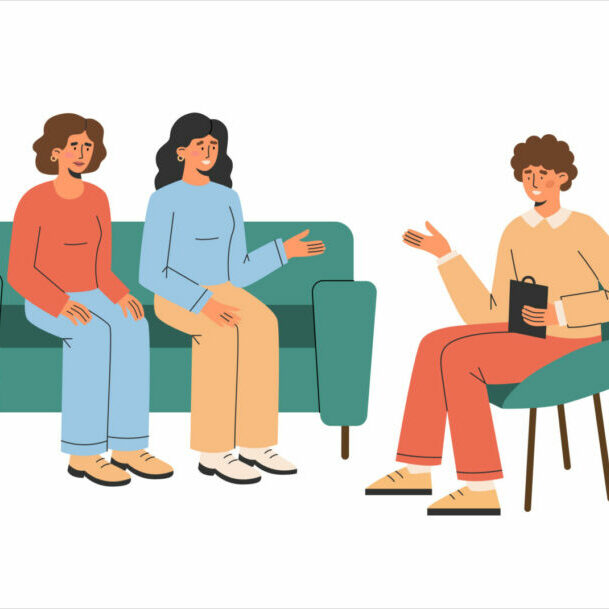Queer Affirming Therapy for Polyamorous Relationships

Polyamory transcends the traditional confines of love by embracing the capacity to love more than one person simultaneously. It’s not merely about the physical or the number of partners one has. At its heart, polyamory champions a philosophy that aims to dismantle the barriers in our hearts to how we give and receive love.
This philosophy underscores the human need to be loved by a community—a tribe that provides deep, supportive connections often missing in contemporary society.
For those who identify as polyamorous, poly structures are integral and act as a lens through which they view and cultivate their relationships, fostering a drive towards communal living and enhanced community bonds.
Challenges Encountered in Polyamorous Relationships
Maintaining relationships is inherently challenging, and polyamorous relationships are no exception.
These challenges aren’t necessarily due to mistakes or wrongdoing on anyone’s behalf but are a part of the complex nature of human relationships.
Queer affirming therapy often reveals that jealousy and envy are significant hurdles. Instead of denying these feelings, LGBTQ+ affirming therapists encourage clients to explore what these emotions signify—perhaps a need for security, esteem, or recognition—pointing to deeper, unmet needs.
Effective Strategies in LGBTQ+ Polyamory
Success in polyamorous relationships often hinges on intentionality and the consistent effort to address and navigate relational challenges. Advocating for oneself, clarity in communication, boundaries, trust, and effective time management are pivotal. Polyamorous affirming therapy stresses the importance of self-care and maintaining individual space amidst the demands of multiple partnerships.
Communication and boundaries are paramount. Regular polycule meetings with clear agendas can help manage and balance the dynamic needs of each partner.
Establishing clear guidelines and adapting them over time as relationships evolve is also crucial. Resources like “Opening Up” by Tristan Taormino provide valuable strategies for managing polyamorous relationships.
The Importance of Polyamorous Affirming Therapy
Polyamorous affirming therapy can be a pivotal resource in navigating the complexities of poly relationships by helping individuals and groups determine which relationship configuration best aligns with their needs and desires.
Recognizing a therapist as “polyamory-friendly” means they are open and accepting but might lack deep knowledge or experience in dealing with polyamorous individuals.
A therapist who is truly affirming of polyamorous relationships will possess specialized knowledge and actively support such relationship styles, helping clients navigate the societal pressures and narratives that may impact them.
Among many other advantages, poly affirming therapy can help to:
- Explore Different Polyamorous Structures
Queer relationships, especially poly relationships, have the advantage that they are less riddled with the confines of societal role expectations. As such, they can take a variety of forms that poly affirming therapy can help partners explore.
One common form is the polyamorous triad, where three individuals engage in a romantic and often intimate relationship. This arrangement might involve all three living under one roof or maintaining separate residences while remaining emotionally and sexually connected. In some triads, existing couples may introduce a third partner, blending their lives in various configurations.
The dynamics of triad relationships can include shared meals and activities, fostering a deep sense of connection and belonging among the partners.
Another structure is the polyamorous quad, involving four individuals. This setup often consists of two couples that merge into a single relational unit, though it can also include four individuals without prior pairings.
Quads allow for rich emotional, physical, and sexual interactions, with some choosing to live together and others maintaining independent living situations. Such arrangements underscore the diversity and adaptability of polyamorous relationships, accommodating various forms of ethical non-monogamy.
For those who prefer autonomy, solo polyamory offers an alternative. Individuals who identify with solo polyamory typically avoid cohabitation and financial entanglements with their partners, emphasizing independence and personal space while engaging in multiple romantic connections.
Kitchen table polyamory is another aspect where individuals not only engage in romantic or sexual relationships but also come together in communal settings, such as shared meals. This style promotes a sense of community and friendship among all participants, enhancing social bonds and providing a supportive network that respects each person’s role and emotions within the group.
- Understanding Relationship Hierarchies
Polyamorous affirming therapy also assists in clarifying the hierarchical structures that may exist within these relationships.
Typically, a primary partner is prioritized in terms of emotional commitment and decision-making, especially regarding sensitive matters like dating others or handling conflicts. Secondary partners, while also significant, generally do not hold the same level of prioritization as primary partners.
- Fostering Connections Between Partners
Polyamorous affirming therapy plays a vital role in helping individuals within polyamorous relationships gain a deeper understanding of their own and their partners’ attachment styles, which is crucial for navigating complex dynamics.
It offers valuable strategies for addressing feelings of jealousy and envy (common emotions in any relationship but especially in non-monogamous settings) that could otherwise prevent such conversations and explorations from happening.
Furthermore, it provides a supportive environment where individuals can explore the impact of previous relationships, including those that may have been traumatic, on their current relational dynamics. By fostering open communication and emotional honesty, poly affirming therapy helps individuals build healthier, more understanding relationships with all partners involved.
Ultimately, polyamorous affirming therapy supports individuals and groups in understanding their own relationship needs, communication patterns, attachment styles, and emotional boundaries. It aids in addressing any underlying issues such as childhood trauma or emotional needs, ensuring that each relationship is healthy, consensual, and fulfilling.
Through this specialized form of therapy, those engaged in or considering polyamory can navigate their relationships with greater awareness and sensitivity, making informed decisions that respect the needs and desires of everyone involved.
Navigating Therapy in Polyamorous Contexts
Securing a therapist who aligns well with your personal and relationship needs can be a daunting task, particularly for those who are non-monogamous and poly. Many within these communities report challenges in locating therapists who are both accepting and well-informed.
In fact, researchers McCoy, Stitson, and colleagues (2015) found that it’s not uncommon for individuals to encounter therapists who view polyamorous relationships as problematic, attributing such relationships to psychological issues like depression or signs of insecure attachment. This can lead to poorer therapy outcomes and even exacerbate distress.
The need to educate a therapist about the nuances of polyamory during therapy sessions can be frustrating, invalidating, and time-consuming. While it is necessary to share personal experiences and the context bringing one to therapy, clients should not need to use extensive session time to inform their therapist about polyamory or justify their relationship choices.
As a queer affirming therapy practice, Tandem Psychology is proud that our team includes poly affirming therapists who are truly competent and supportive in addressing the needs of the polyamorous community.
Virtual Therapy and Alternatives
If local options are scarce and you’re unable to locate polyamory-supportive therapists nearby, consider engaging our polyamorous affirming therapists via telehealth.
Online therapy offers the flexibility to connect with therapists who specialize in polyamory through video conferencing, providing the quality care you need from the comfort of your home.
Should challenges persist in finding a therapist well-versed in polyamory, consider consulting LGBTQ+ affirming therapists, regardless of your sexual orientation.
Queer affirming therapy is often more receptive to diverse relationship structures and therapists are more likely to have experience with clients who practice non-monogamy.
This approach can be particularly useful for those seeking personalized care that respects but isn’t solely focused on their polyamorous relationships.
The journey towards embracing polyamory within the LGBTQ+ community involves finding skilled LGBTQ+ affirming therapists who can offer the necessary support. As societal understanding grows, so does the availability of therapists who are not just accepting but are actively engaged in queer affirming therapy and polyamorous affirming therapy, fostering a healthier approach to exploring and maintaining these relationships.
This blog is made for informational and educational purposes only. It is not medical advice. The information in this blog is not intended to (1) replace a one-on-one relationship with a qualified licensed health care provider, (2) create or establish a provider-patient relationship, or (3) create a duty for us to follow up with you.



